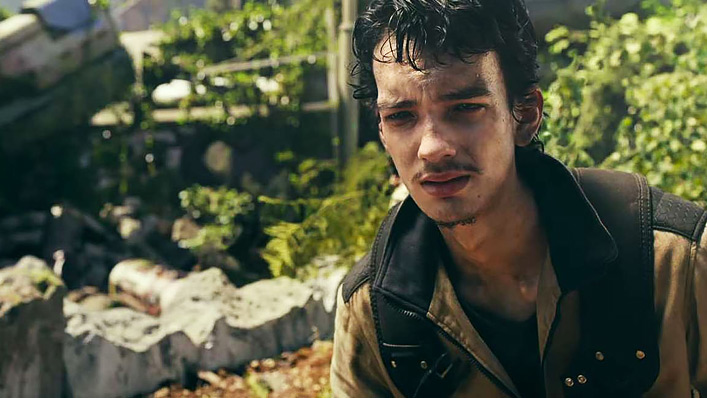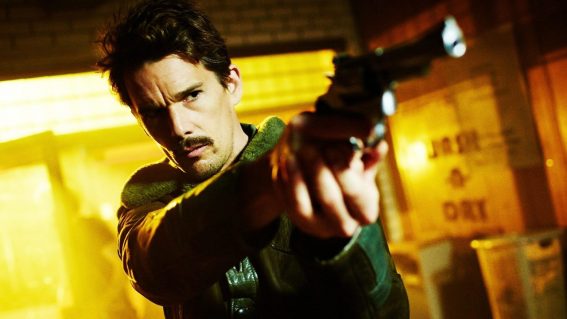Australian sci-fi 2067 tries to save the future from mistakes of the past – and almost succeeds

The opening night film of this year’s Adelaide Film Festival, 2067, is a time-traveling sci-fi based in a future devastated by climate change. It’s big on ideas but dramatically limited, writes critic Travis Johnson.
In the eponymous year 2067 ecological catastrophe has wiped out all plant life and the remnants of humanity eke out a living in vast underground cities, sucking on bottled artificial air. This situation is obviously untenable, but the powers that be, personified by Deborah Mailman’s icy corporate executive, have a plan: send some brave soul forward in time to a point in the far future when humanity has overcome the crisis and hopefully bring back the requisite world-saving info.
See also:
* All movies now playing in cinemas
* All new streaming movies & series
Lowly maintenance tech Ethan Whyte (Kodi Smit-McPhee) is tapped for the task, for two key reasons. One, his late father, Richard (Aaron Glenane) invented the time travel machinery involved. Two, a burst of data sent back from the future specifically requested him by name…
For a country that doesn’t produce a huge amount of genre films, Australia has a well-established tradition of time travel movies: Playing Beattie Bow, The Time Guardian, The Infinite Man, Predestination, and so on. Writer and director Seth Larney adds an ecopunk touch to the subgenre with his second feature film (after Malaysian actioner Tombiruo: Penunggu Rimba), positing a bleak future that has clearly and directly grown out of our own current environmental mismanagement.

The opening sequence of a spinning planet earth being scourged by vast wildfires as news reports on voice-over document the Fall of Man is genuinely chilling, and will certainly ping the memory of anyone who has paid attention to, well, damn near anything over the past couple of years. Add to that a talented Australian cast (Ryan Kwanten, Damian Walshe-Howling, and Natasha Wanganeen all show up) and some truly impressive and imaginative dystopian production design and 2067 should be one for the books. Instead, it’s merely pretty good.
Why? Discipline more than anything else. At a tight 95 minutes, 2067 could be the business, but it’s 114 and flabby to boot, padded with lots of portentous, repetitive dialogue and a few too many flashbacks for comfort. 2067 is big on ideas, but not too crash hot when it comes to grounding them in human motivations and relationships. To be fair, the film does try to connect the universal with the personal quite directly—that’s why our man Ethan is on his Hail Mary mission, after all—but in practice the talented cast has to struggle against flat dialogue and thinly written characters. In the lead, Smit-McPhee is all but a cipher, and given how much time is spent detailing his past, his family and his love for his dangerously ill wife (Sana’a Shaik), that’s pretty damning.
Still, there’s a lot to love here. Larney, whose background is in special effects, gets to imagine two futures: the Blade Runner/12 Monkeys urban dystopia of the title year, and the lush but unpopulated far future into which is Ethan is flung, where forests have reclaimed urban spaces and our hero must fossick through abandoned laboratories in search of clues (shades of Fallout, don’t you think?). Some of the details don’t quite add up (if there’s no oxygen in the atmosphere, how can there be combustion?) but both settings are striking in effect and execution.
But perhaps the most impressive thing about 2067 is how of-the-moment it feels. Sci-fi is, at its best, a reflection of the time it is made in rather than a prediction of the future, and when it’s firing on all cylinders Larney’s film captures the feeling of standing on the precipice of the apocalypse. After 12 months of hellish bushfires, a global pandemic, and nigh-universal economic upheaval, it’s easy to see ourselves among the film’s embattled and huddled future humanity—if nothing else, we all have to wear masks, right?
And yet, despite its bleak and brutal set dressing, 2067 offers a message of hope, its protagonist hurtling into an unknown tomorrow on the promise that someone, somewhere down the track, is still tending the flame. Thin hope in the face of overwhelming odds seems like a very timely theme right now, so perhaps, for all its flaws, 2067 might be the sci-fi film of the moment. For the moment, at least.

















